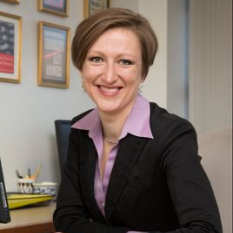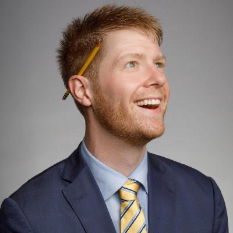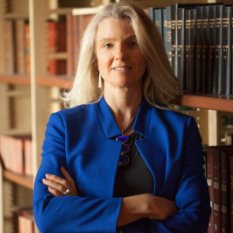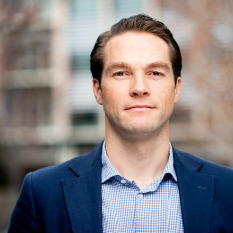
Julia Minson julia_minson@hks.harvard.edu
Julia Minson is an Associate Professor of Public Policy at the Harvard Kennedy School of government. She is a social psychologist with research interests in conflict, negotiations and judgment and decision making. Her primary line of research addresses the “psychology of disagreement” – How do people engage with opinions, judgments and decisions that are different from their own? She explores this theme in the context of group decision making to uncover the psychological biases that prevent managers, consumers, and policy-makers from maximizing the benefits of collaboration. She also studies the conditions that make people willing to listen and be receptive to views and opinions they strongly oppose on political and social topics.

Michael Yeomans m.yeomans@imperial.ac.uk
Mike is currently an Assistant Professor in Strategy and Organisational Behaviour at Imperial College Business School. Mike completed his undergraduate degree in Psychology at the University of Toronto and in 2014, he completed a PhD and an MBA in Behavioral Science at the University of Chicago Booth School of Business. Mike’s research program is focused on the Behavioral Science of Big Data - how new datasets and algorithms are changing our daily life, and expanding the researcher toolbox. Across several domains - conversations, recommendations, and online education - Mike has explored the ways that big data can help to uncover the roots of our decision-making, while nurturing and guiding our behavior outside the lab.

Frances Chen frances.chen@psych.ubc.ca
Dr. Frances Chen is an Associate Professor in the Department of Psychology at the University of British Columbia. Her research explores the intersection of social psychology and health psychology, linking our social lives (and, increasingly, our online social lives), mental health and physical health. Research interests include social behaviour, relationships, social support, stress, coping, conflict and negotiation, social neuroscience, neurobiology, neuroendocrinology.

Francesca Gino FGino@hbs.edu
Francesca Gino is an award-winning researcher who focuses on why people make the decisions they do at work, and how leaders and employees have more productive, creative and fulfilling lives. She is the Tandon Family Professor of Business Administration in the Negotiation, Organizations & Markets Unit at Harvard Business School and the author, most recently, of “Rebel Talent: Why it Pays to Break the Rules in Work and Life.” Gino is also affiliated with the Program on Negotiation at Harvard Law School, the Mind, Brain, Behavior Initiative at Harvard, and the Behavioral Insight Group at Harvard Kennedy School. She co-chairs HBS Executive Education programs on Behavioral Economics (focused on how to apply behavioral insights to organizational problems) and Driving Profitable Growth.

Catherine Tinsley tinsleyc@georgetown.edu
Catherine Tinsley, Ph.D., is a professor of management at Georgetown University’s McDonough School of Business, executive director of the Georgetown University Women’s Leadership Institute, academic director of Georgetown McDonough’s Executive Master’s in Leadership program, and a senior policy scholar at McDonough’s Center for Business and Public Policy. Tinsley is an expert on the gender pay gap, gender dynamics in the workplace, and interventions to promote women’s leadership. She recently participated in The World Economic Forum’s 2015 annual meeting in Davos, Switzerland where she took part in the Women’s Economic Empowerment discussion, as a primary investigator on the subject of “Women and Confidence.” In 2012 and 2013, she partnered with the U.S. Chamber of Commerce to study a decade of gender in the C-suite—researching how women fared relative to men in publicly traded companies from 2000-2010.

Hanne Collins hcollins@hbs.edu
Hanne is a PhD student in Organizational Behavior at Harvard Business School. She is interested in understanding how people navigate the complexities of conversation. She is especially interested in how we think about and (mis)understand the minds of others in conversation and how we can optimize these interactions to get the most out of our relationships. In another line of research, she is interested in understand why so many people fail to take and enjoy their time off from work. Hanne received her B.A. Honors in Psychology from the University of British Columbia in Vancouver, Canada.

Brian Reschke brianreschke@byu.edu
Brian P. Reschke (Ph.D. UC Berkeley) is an assistant professor of entrepreneurship at the Marriott School. He studies the social and cognitive processes whereby markets evaluate novel products, ideas, and organizations. In recent projects, he has studied status hierarchies, social network dynamics, and the role of language in crowdfunding campaigns. His research augments traditional methodological approaches with insights from computer science. He has a deep appreciation for the educational opportunities at BYU, where he earned a BS management degree in OBHR. When not working, Reschke enjoys running, cooking, hiking, reading, and spending time with wife, Cami, and four children.

Hannah Riley Bowles hannah_bowles@hks.harvard.edu
Hannah Riley Bowles is the Roy E. Larsen Senior Lecturer in Public Policy and Management at the Harvard Kennedy School (HKS). Hannah chairs the HKS Management, Leadership, and Decision Sciences (MLD) Area and co-directs the HKS Women and Public Policy Program (WAPPP). She is a leading expert on how gender influences pay negotiations and more broadly on negotiation as a micro-mechanism of inequality. Her current research focuses on women's leadership advancement, examining both situational barriers and individual strategies. Her research appears in academic publications, such as the Academy of Management Journal, Journal of Personality and Social Psychology, Organizational Behavior and Human Decision Processes, Organization Science, Psychological Science, and Journal of Behavioral Decision Making. Her research has been featured in major news media, including ABC News, National Public Radio, New York Times, Slate Magazine, The Atlantic, The Boston Globe, The Wall Street Journal, The Washington Post, and TIME. She is the faculty director of Women & Power, the HKS executive program for women in senior leadership from the public, private and non-profit sectors. She won the HKS Manuel Carballo Award for Excellence in Teaching in 2003. She has been actively involved in negotiation and conflict management training, practice, and research for over 25 years, including early career opportunities to work for the governments of Argentina, Costa Rica, and Germany. She has a DBA from the Harvard Business School, an MPP from HKS, and a BA from Smith College.

Mathijs de Vaan mdevaan@haas.berkeley.edu
Mathijs De Vaan is an Assistant Professor at the Haas School of Business. He earned his PhD from the Department of Sociology at Columbia University after defending his dissertation in June 2015. Mathijs’ main research agenda focuses on social networks in health care. Motivated by the high level of variation in the cost and quality of care, Mathijs’ research examines the role of relationships between patients, between physicians, and between patients and physicians in the emergence and persistence of this variation. A second line of inquiry focuses on inequality in the production of science.

Sameer Srivastava srivastava@haas.berkeley.edu
Sameer B. Srivastava is Associate Professor and Harold Furst Chair in Management Philosophy and Values at UC Berkeley's Haas School of Business and is also affiliated with UC Berkeley Sociology. His research unpacks the complex interrelationships among the culture of social groups, the cognition of individuals within these groups, and the connections that people forge within and across groups. Much of his work is set in organizational contexts, where he uses computational methods to examine how culture, cognition, and networks relate to career outcomes. His work has been published in journals such as American Journal of Sociology, American Sociological Review, Administrative Science Quarterly, Management Science, and Organization Science. It has been covered in media outlets such as The New York Times, Fortune, The Wall Street Journal, Financial Times, and Forbes. Sameer teaches a popular MBA elective course, Power and Politics in Organizations, and co-directs the Berkeley-Stanford Computational Culture Lab. In a prior career, Sameer was a partner at a global management consultancy (Monitor Group; now Monitor Deloitte). He holds AB, AM, MBA, and PhD degrees from Harvard University.

Zakary Tormala ztormala@stanford.edu
Professor Tormala received a B.A. in psychology from Arizona State University in 1996 and earned his Ph.D. in social psychology from Ohio State University in 2003. From 2003-2007, Tormala served as an assistant professor of social psychology at Indiana University. In 2007, he joined the Stanford faculty as an associate professor in the Graduate School of Business. Tormala’s research focuses primarily on the topics of attitudes, persuasion, and social influence. He specializes in conducting lab and field experiments designed to enhance our understanding of attitude, belief, and behavior change. Tormala publishes extensively on these topics and has served on the editorial boards of the leading scientific journals in his field. For his contribution to scholarly research, Tormala received the Society for Consumer Psychology’s Early Career Award for Distinguished Scientific Contribution in 2008 and was named to the Marketing Science Institute’s list of Young Scholars in 2009. He is also an elected fellow of the Society for Personality and Social Psychology and the Society for Experimental Social Psychology. At Stanford, Professor Tormala teaches courses on persuasion in the MBA program, the PhD program, and numerous executive education programs.

Markus Heinrichs heinrichs@psychologie.uni-freiburg.de
Professor Heinrichs received his PhD at the University of Trier in Germany, and is now the Director of the Laboratory for Biological and Personality Psychology at the University of Freiburg. Professor Heinrichs studies the psychobiological foundations of social interaction; stress- and anxiety-protective factors; and the diagnostics, prevention, and therapy of stress and stress-related disorders.
- © Copyright 2020